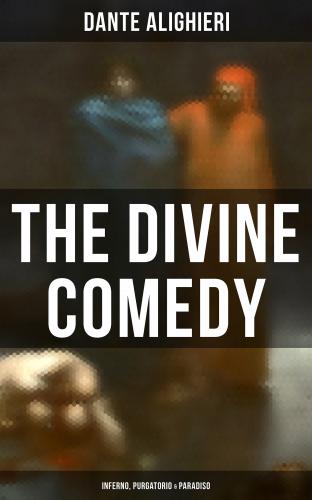So long as virtue to her spouse was pleasing.
Ye have made yourselves a god of gold and silver;
And from the idolater how differ ye,
Save that he one, and ye a hundred worship?
Ah, Constantine! of how much ill was mother,
Not thy conversion, but that marriage dower
Which the first wealthy Father took from thee!"
And while I sang to him such notes as these,
Either that anger or that conscience stung him,
He struggled violently with both his feet.
I think in sooth that it my Leader pleased,
With such contented lip he listened ever
Unto the sound of the true words expressed.
Therefore with both his arms he took me up,
And when he had me all upon his breast,
Remounted by the way where he descended.
Nor did he tire to have me clasped to him;
But bore me to the summit of the arch
Which from the fourth dike to the fifth is passage.
There tenderly he laid his burden down,
Tenderly on the crag uneven and steep,
That would have been hard passage for the goats:
Thence was unveiled to me another valley.
Canto XX. The Fourth Bolgia: Soothsayers. Amphiaraus, Tiresias, Aruns, Manto, Eryphylus, Michael Scott, Guido Bonatti, and Asdente. Virgil reproaches Dante's Pity. Mantua's Foundation.
Of a new pain behoves me to make verses
And give material to the twentieth canto
Of the first song, which is of the submerged.
I was already thoroughly disposed
To peer down into the uncovered depth,
Which bathed itself with tears of agony;
And people saw I through the circular valley,
Silent and weeping, coming at the pace
Which in this world the Litanies assume.
As lower down my sight descended on them,
Wondrously each one seemed to be distorted
From chin to the beginning of the chest;
For tow'rds the reins the countenance was turned,
And backward it behoved them to advance,
As to look forward had been taken from them.
Perchance indeed by violence of palsy
Some one has been thus wholly turned awry;
But I ne'er saw it, nor believe it can be.
As God may let thee, Reader, gather fruit
From this thy reading, think now for thyself
How I could ever keep my face unmoistened,
When our own image near me I beheld
Distorted so, the weeping of the eyes
Along the fissure bathed the hinder parts.
Truly I wept, leaning upon a peak
Of the hard crag, so that my Escort said
To me: "Art thou, too, of the other fools?
Here pity lives when it is wholly dead;
Who is a greater reprobate than he
Who feels compassion at the doom divine?
Lift up, lift up thy head, and see for whom
Opened the earth before the Thebans' eyes;
Wherefore they all cried: 'Whither rushest thou,
Amphiaraus? Why dost leave the war?'
And downward ceased he not to fall amain
As far as Minos, who lays hold on all.
See, he has made a bosom of his shoulders!
Because he wished to see too far before him
Behind he looks, and backward goes his way:
Behold Tiresias, who his semblance changed,
When from a male a female he became,
His members being all of them transformed;
And afterwards was forced to strike once more
The two entangled serpents with his rod,
Ere he could have again his manly plumes.
That Aruns is, who backs the other's belly,
Who in the hills of Luni, there where grubs
The Carrarese who houses underneath,
Among the marbles white a cavern had
For his abode; whence to behold the stars
And sea, the view was not cut off from him.
And she there, who is covering up her breasts,
Which thou beholdest not, with loosened tresses,
And on that side has all the hairy skin,
Was Manto, who made quest through many lands,
Afterwards tarried there where I was born;
Whereof I would thou list to me a little.
After her father had from life departed,
And the city of Bacchus had become enslaved,
She a long season wandered through the world.
Above in beauteous Italy lies a lake
At the Alp's foot that shuts in Germany
Over Tyrol, and has the name Benaco.
By a thousand springs, I think, and more, is bathed,
'Twixt Garda and Val Camonica, Pennino,
With water that grows stagnant in that lake.
Midway a place is where the Trentine Pastor,
And he of Brescia, and the Veronese
Might give his blessing, if he passed that way.
Sitteth Peschiera, fortress fair and strong,
To front the Brescians and the Bergamasks,
Where round about the bank descendeth lowest.
There of necessity must fall whatever
In bosom of Benaco cannot stay,
And grows a river down through verdant pastures.
Soon as the water doth begin to run,
No more Benaco is it called, but Mincio,
Far as Governo, where it falls in Po.
Not far it runs before it finds a plain
In which it spreads itself, and makes it marshy,
And oft 'tis wont in summer to be sickly.
Passing that way the virgin pitiless
Land in the middle of the fen descried,
Untilled and naked of inhabitants;
There to escape all human intercourse,
She with her servants stayed, her arts to practise
